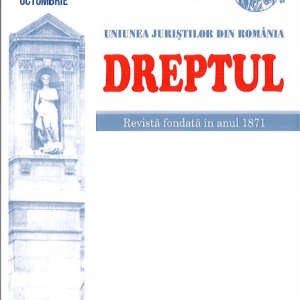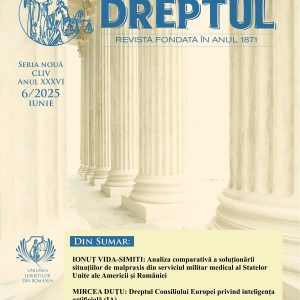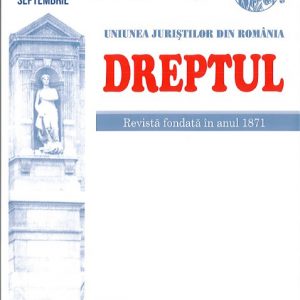-
 This study analyzes the consequences of the intervention of a more favourable retroactive contraventional law (in a broad sense) both in terms of substantive law and in terms of the procedural instruments which establish the intervention of this norm. Analyzing the incidental legislation in the light of the provisions of the criminal law, which constitutes the „general law” in the interpretation of the rules of the material contraventional law, according to the provisions of Article 47 of the Government Ordinance No 2/2001, we came to the conclusion that both the decontraventionalisation law and the more favourable contraventional law operate by law, the bodies with attributions in contraventional matters “noting”, and not “pronouncing” the effects generated by the intervention of the more favourable law in a broad sense. This conclusion transposed at procedural level required a concrete analysis of the procedural institutions by which the effects of the retroactive law are taken into account depending on the procedural moment in which it intervenes.
This study analyzes the consequences of the intervention of a more favourable retroactive contraventional law (in a broad sense) both in terms of substantive law and in terms of the procedural instruments which establish the intervention of this norm. Analyzing the incidental legislation in the light of the provisions of the criminal law, which constitutes the „general law” in the interpretation of the rules of the material contraventional law, according to the provisions of Article 47 of the Government Ordinance No 2/2001, we came to the conclusion that both the decontraventionalisation law and the more favourable contraventional law operate by law, the bodies with attributions in contraventional matters “noting”, and not “pronouncing” the effects generated by the intervention of the more favourable law in a broad sense. This conclusion transposed at procedural level required a concrete analysis of the procedural institutions by which the effects of the retroactive law are taken into account depending on the procedural moment in which it intervenes. -
 Company contract has been a complex issue under the Civil Code of 1864 and the Commercial Code of 1887, and continues to be so under the Romanian Civil Code of 2009. Since rules pertaining to company contract under previous statutes became obsolete and ill-adapted to practical needs and realities, an update was severely necessary in order to tune it with the alert pace of modern legal relations and EU norms. This paper presents the legal definition of company contract under the new Romanian Civil Code, with its advantages and disadvantages, which distinguish it from other types of contracts. Given the monistic approach of the new Civil Code, presently the contract of company is the common law of company law, Articles 1881–1948 of the Civil Code being subsidiarily applied to all companies enumerated by Article 1888 of the Civil Code. In this context, this study analyses the special requirements of Law No 31/1990, considered as a special rule in relation to the general provisions of the Civil Code.
Company contract has been a complex issue under the Civil Code of 1864 and the Commercial Code of 1887, and continues to be so under the Romanian Civil Code of 2009. Since rules pertaining to company contract under previous statutes became obsolete and ill-adapted to practical needs and realities, an update was severely necessary in order to tune it with the alert pace of modern legal relations and EU norms. This paper presents the legal definition of company contract under the new Romanian Civil Code, with its advantages and disadvantages, which distinguish it from other types of contracts. Given the monistic approach of the new Civil Code, presently the contract of company is the common law of company law, Articles 1881–1948 of the Civil Code being subsidiarily applied to all companies enumerated by Article 1888 of the Civil Code. In this context, this study analyses the special requirements of Law No 31/1990, considered as a special rule in relation to the general provisions of the Civil Code. -
 The author shows that, in the new regulation, the essential characteristic regarding the social danger entailed by the criminal action committed was removed from the definition of the crime. Instead, two new essential characteristics were introduced, namely: the action committed, which is provided by the criminal law, is unjustified and not imputable to the person having committed it. Also, reference is made to the correlation between the institution of the action provided by criminal law and the institution of the crime and the essential characteristics of the crime are examined.
The author shows that, in the new regulation, the essential characteristic regarding the social danger entailed by the criminal action committed was removed from the definition of the crime. Instead, two new essential characteristics were introduced, namely: the action committed, which is provided by the criminal law, is unjustified and not imputable to the person having committed it. Also, reference is made to the correlation between the institution of the action provided by criminal law and the institution of the crime and the essential characteristics of the crime are examined. -
 Starting from a legal classification found in a situation from the judicial practice, the author of this study addresses the delicate issue constantly generating contradictory solutions of the relation between the abuse of office and other offences from the same category, committed by the same deed, applying the rules of ideal (formal) concurrence of offences. The arguments are convincing and allow the conclusion that, in such situations, it cannot be retained the commission of a concurrence of offences, whereas the abuse of service, whether there are involved deeds committed under the incidence of the current Criminal Code or of the previous Criminal Code, maintains its subsidiary character, the incrimination text which defines it becoming incident only insofar as it cannot be retained another offence which violates the social relations that constitute legal object for these service offences.
Starting from a legal classification found in a situation from the judicial practice, the author of this study addresses the delicate issue constantly generating contradictory solutions of the relation between the abuse of office and other offences from the same category, committed by the same deed, applying the rules of ideal (formal) concurrence of offences. The arguments are convincing and allow the conclusion that, in such situations, it cannot be retained the commission of a concurrence of offences, whereas the abuse of service, whether there are involved deeds committed under the incidence of the current Criminal Code or of the previous Criminal Code, maintains its subsidiary character, the incrimination text which defines it becoming incident only insofar as it cannot be retained another offence which violates the social relations that constitute legal object for these service offences. -
 Within every form of legal liability, the act inconsistent with the legal rules for which liability is engaged is qualified expressly by law. This study aims to analyze comparatively the offence and the contravention, regarded in the light of recent legislative influences, appeared in the field of criminal law. In order to achieve this intended objective, the structure of the material elaborated by the author envisages the following sequence: the historical evolution of the offence and of the contravention; the definition of the offence and of the contravention; the system of punishments and the sanctioning regime; other aspects of the legal regime of the offence and of the contravention. The analysis covers the following: the stage of legislation, the point of view of the doctrine, as well as the case-law. Finally, there are presented the conclusions reached as a result of this approach and there are formulated de lege ferenda proposals.
Within every form of legal liability, the act inconsistent with the legal rules for which liability is engaged is qualified expressly by law. This study aims to analyze comparatively the offence and the contravention, regarded in the light of recent legislative influences, appeared in the field of criminal law. In order to achieve this intended objective, the structure of the material elaborated by the author envisages the following sequence: the historical evolution of the offence and of the contravention; the definition of the offence and of the contravention; the system of punishments and the sanctioning regime; other aspects of the legal regime of the offence and of the contravention. The analysis covers the following: the stage of legislation, the point of view of the doctrine, as well as the case-law. Finally, there are presented the conclusions reached as a result of this approach and there are formulated de lege ferenda proposals. -
 In the present scientific study, we decided to carry out a thorough investigation into the concept of applying criminal liability for swindling in the conditions in which the state has a limited role in regulating the economic market relations and the coercive methods of preventing and combating this crime which must have a status subordinated to economic, informational, political, juridical-civil methods. In order to make the prevention of scams more effective, it is necessary to strictly correlate it with the many transformations and processes taking place in the political, economic, social and ideological domain of the state.
In the present scientific study, we decided to carry out a thorough investigation into the concept of applying criminal liability for swindling in the conditions in which the state has a limited role in regulating the economic market relations and the coercive methods of preventing and combating this crime which must have a status subordinated to economic, informational, political, juridical-civil methods. In order to make the prevention of scams more effective, it is necessary to strictly correlate it with the many transformations and processes taking place in the political, economic, social and ideological domain of the state. -
 The legality of judgments adopted by courts, the effectiveness of law enforcement functions and the enforcement of criminal repression in respect of offenders are the priority issues that justice reform in the Republic of Moldova must address. The existence of an independent and impartial judiciary is an inherent attribution of a state without which a democratic society can not be built. And, the protection of legality in the field of justice is indispensably conditioned by ensuring the achievement of the purposes of the judicial process.
The legality of judgments adopted by courts, the effectiveness of law enforcement functions and the enforcement of criminal repression in respect of offenders are the priority issues that justice reform in the Republic of Moldova must address. The existence of an independent and impartial judiciary is an inherent attribution of a state without which a democratic society can not be built. And, the protection of legality in the field of justice is indispensably conditioned by ensuring the achievement of the purposes of the judicial process. -
 For the correct qualification of an act of a servant who, in the exercise of his office duties, knowingly does not act or fails to act correctly, by misleading a person, presenting as true a false or misleading act or as false a true act, it is necessary to draw the line between fraud offence, involving a misleading activity, and the offense of abuse of office against private interests as malfeasance while in office, regarding which the question is whether it can be committed through acts of deceit and in case this possibility exists, if it will be considered abuse of office against private interests, or there are cases, although this special quality exists, it will be considered fraud offence.
For the correct qualification of an act of a servant who, in the exercise of his office duties, knowingly does not act or fails to act correctly, by misleading a person, presenting as true a false or misleading act or as false a true act, it is necessary to draw the line between fraud offence, involving a misleading activity, and the offense of abuse of office against private interests as malfeasance while in office, regarding which the question is whether it can be committed through acts of deceit and in case this possibility exists, if it will be considered abuse of office against private interests, or there are cases, although this special quality exists, it will be considered fraud offence. -
 This article presents the procedural features of the principle non reformatio in pejus in civil procedural area. It aims to concentrate the main theoretical and practical concepts exposed during the time, relating to the limits of this principle. Finally, the study is dedicated to analyze the real interference between different peremptory rules, which govern the appeal, and the principle analyzed.
This article presents the procedural features of the principle non reformatio in pejus in civil procedural area. It aims to concentrate the main theoretical and practical concepts exposed during the time, relating to the limits of this principle. Finally, the study is dedicated to analyze the real interference between different peremptory rules, which govern the appeal, and the principle analyzed. -
 Considering the importance that information technology has acquired in recent years and how it has come to influence the criminal policy at the international level, the author of this study founds it necessary to analyse the subject matter of the offence taking into account this new technological context. Thus, it has been attempted to highlight the need for a reconceptualization of the offence’s subject matter, emphasizing the idea according to which intangible elements may be part of its structure. In support of this thesis, there was reviewed the problem of theft of virtual goods and of certain cybercrimes that reveal the existence of an intangible subject matter which is likely to be interposed between the agent’s behaviour and the social value protected by the rule of incrimination. Last but not least, the author has pointed out a possible consequence of the reconceptualization of the subject matter of the offence, referring thus to the applicability of the supporting cause of self-defence.
Considering the importance that information technology has acquired in recent years and how it has come to influence the criminal policy at the international level, the author of this study founds it necessary to analyse the subject matter of the offence taking into account this new technological context. Thus, it has been attempted to highlight the need for a reconceptualization of the offence’s subject matter, emphasizing the idea according to which intangible elements may be part of its structure. In support of this thesis, there was reviewed the problem of theft of virtual goods and of certain cybercrimes that reveal the existence of an intangible subject matter which is likely to be interposed between the agent’s behaviour and the social value protected by the rule of incrimination. Last but not least, the author has pointed out a possible consequence of the reconceptualization of the subject matter of the offence, referring thus to the applicability of the supporting cause of self-defence. -

-
 The jurists naturally privilege the continuity, stability, coherence. If the political tends to periodically break the coherence of the social structures, the jurists conceive themselves as „doctors” thereof, and „their technique is precisely the extirpation of the void, the anticipation of the crises, the assurance of the continuity, or even the mending, after the stroke, of the ruptures of the institutional weave”1. The legal privileging of the continuity of the social evolution is translated by the structuring of the system on the basis of some principles aimed at attenuating the tendencies of radicalization of the social claims in the name of the prevalence of a certain conception about the good society over its alternatives. It is fundamental for the jurists that the law ensures the priority of the protection of freedom through the mechanisms of the rule of law over the general interest resulted from the democratic exercise of power. The law based on this vision can not be the result of a general transcendent interest over the interests of the members of the society, but must be the result of the accessibility and availability thereof.
The jurists naturally privilege the continuity, stability, coherence. If the political tends to periodically break the coherence of the social structures, the jurists conceive themselves as „doctors” thereof, and „their technique is precisely the extirpation of the void, the anticipation of the crises, the assurance of the continuity, or even the mending, after the stroke, of the ruptures of the institutional weave”1. The legal privileging of the continuity of the social evolution is translated by the structuring of the system on the basis of some principles aimed at attenuating the tendencies of radicalization of the social claims in the name of the prevalence of a certain conception about the good society over its alternatives. It is fundamental for the jurists that the law ensures the priority of the protection of freedom through the mechanisms of the rule of law over the general interest resulted from the democratic exercise of power. The law based on this vision can not be the result of a general transcendent interest over the interests of the members of the society, but must be the result of the accessibility and availability thereof.
